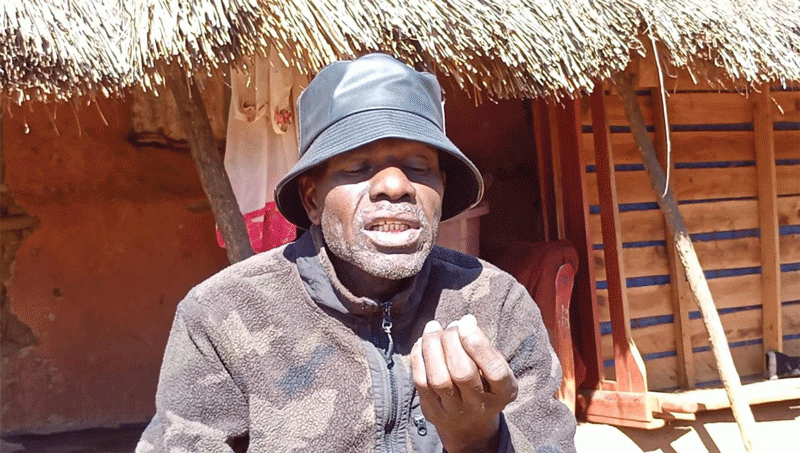
TODAY, their most-listened to song, Getu, can only be enjoyed over the internet.
On the radio, maybe it’s played here and there.
It’s only memories that fill one’s mind when they hear it blazing on speakers, with another sad mind reminding the listener that the group behind the 1990s hit song, Wrist Brothers, will never possibly pull another trick and come up with another hit song.
How sad!
They once lit up farm compounds and rural stages with the fast-paced rhythms of sungura, their guitars echoing through Chegutu’s dusty fields.
Their songs told stories of love, struggle and life in the margins — stories that made people dance and believe.
But today, only two members of the once-vibrant group remain, their lives now a far cry from the applause they once knew.
One now survives by hewing wood, cutting grass and doing other menial jobs in Chegutu’s farms, his calloused hands no longer strumming chords, but hardened by splitting logs and those other difficult tasks.
- CCC cries foul as Chamisa is blocked
- CCC cries foul as Chamisa is blocked
- Mambo Hermus: Chegutu’s unsung music hero
- Community Builder:Chako doing more than just business
Keep Reading

The other searches for survival underground — panning for gold in riverbeds, chasing fortune where hope runs thin.
Their instruments are silent, their names nearly forgotten, yet their journey still echoes with the pain and resilience of fallen stars.
Yesteryear and forgotten group famed Wrist Brothers’ only two surviving members Salim Chikuta (63) and Gordon Ncube (53) have been hit by hard times and are pleading for help to pull themselves from the jaws of poverty.
During a visit to De Rus Farm in Chegutu, Mashonaland West province, where Chikuta stays in a farm compound, NewsDay Weekender Life & Style noticed how life has turned so difficult for him.
“We are kindly looking for a sponsor who may assist us to buy a set of musical instruments and a vehicle to carry us to and from shows so that we can revive our careers.
“Even a Honda Fit or a tricycle may do, especially for my day-to-day tasks,” Chikuta said.
“I live here, but I am surviving from hand to mouth. I sell firewood, cutting grass and get US$1 from six bundles [of grass] and out of that hard work, I get money to put food on the table.
“Sometimes, I walk for long distances of about 17km to do some menial jobs.”

He added: “As you can see with where I live, my houses are thatched, constructed of logs, they look old and during the rainy season, I am always soaked.
“This bicycle you see here is not mine, I borrowed it from my friend as I can’t walk for long distances.
“I don’t even have a radio, let alone a smartphone. I only have a memory card loaded with our music.
“It touches me a lot, especially when I pass by places where our music is being played.”
A former tractor driver at the farm and a father of five, Chikuta’s love for music is unquestionable as he walks or cycles to Chegutu town, a distance of about 6km, to check on posters pasted on poles or street corners for any band intending to stage shows in the agriculture and mining town.
“I always come to town at least twice a week to see if there is any group having a show during weekends,” the 63-year-old said, his face punctuated by sorrow.
“If by chance there is any, we gather as a band and plead with them to be curtain raisers and that way, we would get a chance to play guitars since we do not have instruments.”
On our arrival at the compound, we could see a few people pacing around, a sign that many of them had gone out to eke a living.
“Most people go out to work and on a good week, we assemble as a band and go to town [Chegutu].
“There is a man there who owns musical instruments. He charges US$15 per hour for us to practice, but these days we pay US$10 because he understands our plight.”
They could not be doing well right now, but at one point, they had their happy moments after the release of their first album Getu — a six-track with songs — Muroora, Sister Rebecca, Getu, Juliana, Vadzimu Makandifuratira and Mukuwasha.
“We had happy moments after the release of Getu, where we were paid ZW$13 600 [US$2 138,36] in December 1994 through the Standard Chartered Bank,” Chikuta said.
“Our recording company, RTP [Records and Tape Promotions], had offered to deduct a quarter of our money after every three months and give us instruments and a truck, but some of the band members were against that idea, opting to do that in future. I simply left the office and shed tears outside out of anger.
“We withdrew our money at Karigamombe Centre. Nearby, there is a toilet along Kwame Nkrumah Avenue, where we paid a fee and ordered the restroom attendant to lock the door and we [five] shared the money equally.”
Chikuta, the composer of the track Muroora added: “I went and bought a hair salon, but sold it after six days for a mere ZW$1 200 even though there were others who wanted to pay more. I would give out money and buy beer for anyone who greeted me.
“Some of my band mates’ marriages broke down. We made our errors, I wish we could have another chance.”
Chikuta remembers how Wrist Brothers mesmerised revellers in Chegutu and went on a nationwide tour.
“We had a live show at our nearby farm, which was well-attended. The farm owner prepared a delicious meal, some whisky, paid us money and during the show, a lot of money was thrown on the stage. We took it all,” he chronicled.
“On our nationwide tour, we had a memorable show at paBhora [Juru] growth point in Murehwa and it stands out as our best show ever.
“We also shared the stage with big names such as Marshall Munhumumwe and the Four Brothers.”
Unfortunately, at its peak, Wrist Brothers was marred by dishonesty among its band members, whereby two of its members would go behind others’ back and claim money from their recording company RTP.
“As a band, we had problems with Philemon Mijoya and Ephraim Tapfumanei.
“They would lie to our recording company, RTP, that they have a family bereavement and money would be released to them.
“We had a show in Chinhoyi and after the show, they lied that we were paid ZW$600, little did they know that I went to the staff toilet because the ordinary toilets were messed up, that’s where I met the hotel manager who confided to me that our payment was ZW$1 300.
“[Mijoya and Tapfumanei] had shared the other ZW$700 between themselves.

“This time we were alert, we made them repay us twice the money they took.
“The two later on died in 1998 and 2002.”
Ncube, the other surviving member and leading vocalist, is based in Kadoma, where he is into gold panning.
He echoed similar sentiments about the band’s challenges.
“We have a number of challenges as a band. We can only overcome them if we get a set of musical instruments and a car. We will take music on full-time basis,” Ncube said.
Wrist Brothers was formed in 1994 and the original members were Mijoya (lead guitar and backing vocals), Ncube (lead vocals), Chikuta (rhythm), Smart Mauto (bass) and Tapfumanei (drums).
“As boys from surrounding farms, we knew our love for music and that was how the group came together.
“The name Wrist came from a wrist of hand, meaning the works of a hand, hence we called ourselves ‘Wrist Brothers’,” Chikuta said.
“The group had no leader. All members were equal and anyone could compose a song so that we would not run short of songs.”
The original band released four album Getu (1994), Mutangi Ndiwe (1995), Sekuru Kuuya (1996) and Ndakarera Ndoga (1998) before death robbed them of Mijoya and Tapfumanei.
“We produced four albums, then Mijoya and Tapfumanei died.
“Our bassist Mauto then left the band when we were about to go for a show after his wife threatened to leave him if ever he continued with music,” Chikuta said.
The band went on to release three albums Musha Ndimai, Gehena and Musara Pavana after replacing Mijoya, Tapfumanei and Mauto.
The new-look Wrist Brothers comprises Ncube (lead vocals), Chikuta (rhythm), Den Mwale (lead guitar), John Mbeve (drums), Musa Imedi (bass guitar) and Trymore Chimbiya (backing vocals).
The group has three albums yet to be released as the band has no equipment to use.
“Right now, we have three albums, which we intend to record as soon as we get musical instruments or assistance,” he said.
Chikuta is a popular figure in the town as he is popularly nicknamed Getu — coined from the hit track Getu — and was always greeted by many.
At one point, he left his bicycle unchained and unattended for a while, but no one touched it.
“They always call me Getu. I can leave even this bicycle unlocked and nobody will attempt to steal because of my popularity,” he said.
Their voices may no longer fill the airwaves, but their plea still carries weight.
They are calling out to well-wishers, music lovers and the nation at large — not just for recognition, but for support.
What they need now is a helping hand to restore dignity to lives once devoted to entertaining others.







